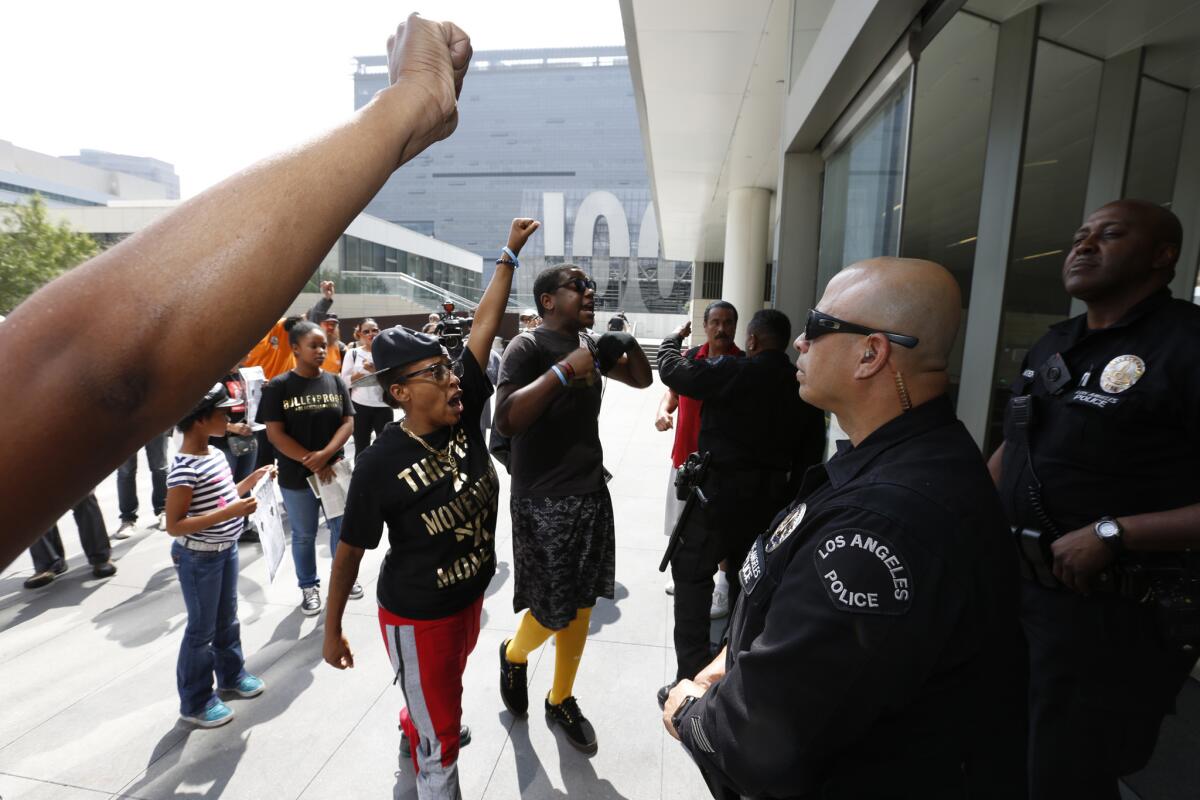Uncovering information about police misconduct might soon get easier in California

Protesters shout their message in the face of an LAPD officers after disrupting the Los Angeles Police Commission meeting in August 2015 on the one-year anniversary of Ezell Ford’s death.
Reporting from Sacramento —
California has some of the strictest laws in the U.S. against publicly releasing information about officer discipline. State Sen. Mark Leno (D-San Francisco) says recent high-profile clashes between police departments and the communities they serve show that now is the time to change the rules.
Leno has introduced SB 1286, which would unravel some of the protections against releasing officer information. His push for transparency is generally supported by police reform advocates as a way to improve police-community relations.
“We can begin to rebuild the critically needed trust between law enforcement and community members,” Leno said. “I don’t think it’s at all debatable that that trust has come into question.”
Leno’s bill will have its first test Tuesday morning at a Senate committee hearing that’s expected to highlight the deep divide between police reform advocates and law enforcement.
Similar efforts to make it easier to learn about officer misconduct aren’t common in other states. Over the last two years, lawmakers in at least half a dozen other statehouses have introduced widely supported bills to restrict access to police information that, in some ways, go even further than California’s presumption of confidentiality over law enforcement records.
The national debate spotlights the broad differences in rules governing police records across the U.S., and it reveals the lack of a clear standard in determining how much the public should know about officers whom departments have found to have behaved badly.
“I wish there was some rhyme or reason to it all,” said John Worrall, a criminology professor at the University of Texas at Dallas who has studied public information laws. “It’s a total hodgepodge ranging from openness to secrecy. And there’s no coherent justification to any of it.”
Nearly 40 years ago, California took its first steps to shield police misconduct from the public when Gov. Jerry Brown signed a law in his first term restricting details of officer personnel files from disclosure. A 2006 California Supreme Court decision went further and extended the law’s protections to cases in which civil service commissions weighed in on officer discipline. Today, almost all details about misconduct — including cases in which police officers were found to have used excessive force, engaged in racial profiling or lied on the job — are kept secret outside of court, administrative or civilian review board proceedings.
And although 23 states keep most public employee personnel records confidential, California is one of just three to provide specific protections for police information, according to a recent investigation by New York’s WNYC Public Radio.
Leno’s bill would allow the public to access police records in cases in which departments have determined officers have committed serious misconduct, and it would allow those who have filed complaints against officers to learn how their cases were handled.
His efforts fall in line with advocates’ call for increased transparency in law enforcement, a push that has grown in intensity after several police shootings have been questioned, including the killing of black teenager Michael Brown in Ferguson, Mo., nearly two years ago.
But these calls for change have sparked a counter-movement spearheaded by police unions and their political allies who have argued that too much openness threatens officer safety and privacy. In California, there’s already deep opposition to Leno’s bill from police unions, police chiefs and district attorneys.
The debate is also occurring in the Legislature among Leno’s Democratic colleagues. Two Democratic assemblymen, Miguel Santiago of Los Angeles and Evan Low of Campbell, have introduced bills that would further restrict information about officers, including in some cases their identities and details about their involvement in shootings and other serious incidents. Two other Assembly Democrats have written legislation that would result in widely different policies governing the disclosure of police body-camera footage — one favors speedy public disclosure and the other requires a court order for any public release.
In Pennsylvania, the battle between transparency and officer privacy sparked a war within a major U.S. city’s police force. Last July, after a spate of police shootings, Charles Ramsey, then Philadelphia’s police chief and co-chairman of a police reform task force appointed by President Obama, announced that his city would release the names of officers involved in shootings within three days as a way to restore community trust.
Ramsey’s decision drew pushback from the city’s police union. It prompted Martina White, a Republican state representative backed by the union, to introduce a bill that would restrict departments from releasing those names until after an investigation was complete.
“Imagine it’s a gang member that’s been shot,” White said in an interview. “Other gang members can then go out and find that officer and his family.”
Over the last two years, lawmakers in at least five other states — Arizona, New Jersey, Oregon, Virginia and West Virginia — have introduced bills to restrict police information from the public that would have often gone beyond California’s anti-disclosure laws. The Virginia bill, which passed its Senate but has since been tabled, would have made the names of all police officers in the state secret. However, some states are attempting to address problem officers by developing rules to deny licenses to officers who have committed crimes or misconduct.
In California, officer identities are public. But restricting the release of police records has meant some misconduct has been kept under wraps along with information about whether those officers kept their jobs or were hired by other departments despite a history of problems.
In 2013, for example, The Times reported that the Los Angeles County Sheriff’s Department had hired dozens of officers with proven serious misconduct, information that emerged after personnel files were leaked.
Police unions opposed to Leno’s bill say criminal and civil remedies as well as citizens’ review boards provide enough opportunities to ensure officer accountability.
Going further to make information from police personnel files public would violate privacy rights, said George Hofstetter, president of the Assn. for Los Angeles Deputy Sheriffs. Beyond that, Hofstetter said, Leno has failed to show that increasing access to police records would improve community trust.
“Sen. Leno and his supporters are trying to capitalize on the sometimes very vocal opposition to law enforcement that we currently see to invade the privacy of peace officers in California,” Hofstetter said.
Follow @dillonliam on Twitter
ALSO:
Lawmaker proposes giving public access to police shooting and misconduct cases
More to Read
Get the L.A. Times Politics newsletter
Deeply reported insights into legislation, politics and policy from Sacramento, Washington and beyond. In your inbox three times per week.
You may occasionally receive promotional content from the Los Angeles Times.











